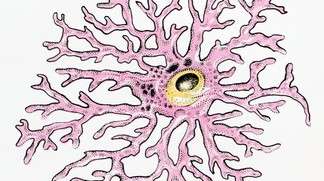The role of lactate in boosting memory

(Medical Xpress)—EPFL researchers have decoded the mechanism by which a glucose derivative activates receptors involved in memorization.
Everyone knows that neurons are the key to how the brain operates. But it turns out they aren't the only stars in the show; neighboring cells called astrocytes are quickly gaining increasing respect for the critical role they play in memory and learning. EPFL scientists have recently outlined the molecular mechanics of this process in an article published in Proceedings of the National Academy of Sciences (PNAS). Lactate produced by the star-shaped astrocytes accelerates the memorization process. This result, surprising until very recently, opens up new possibilities for treating cognitive and memory disorders, as well as psychiatric conditions such as depression.
Our brains are greedy, gobbling up as much as 25% of our daily energy consumption. Neurons and astrocytes thrive on glucose. Neurons use it to protect themselves from the buildup of toxic products resulting from their activity. Astrocytes, which are glial cells (as opposed to neurons), manufacture lactate; this was long thought to be a byproduct of glucose metabolism, and then as a simple energy source for neurons.
In 2011, research published in the journal Cell by EPFL's Laboratory of Neuroenergetics and Cellular Dynamics in collaboration with a U.S. team unveiled the critical role of lactate. "In vivo, when the transfer of lactate from astrocytes to neurons is blocked, we found that the memorization process was also blocked," explains EPFL professor Pierre Magistretti, head of the lab. "We thus knew that it was an essential fuel for that process."
Focusing their attention on the molecular mechanism, the scientists discovered that lactate provides more than just energy. It acts as a moderator of one type of glutamate receptor (NMDA receptors), the nervous system's primary neurotransmitter. This glutamate receptor is involved in the memorization process, and the research demonstrates that lactate gives them what amounts to a turbo-boost. "Glutamate lets you drive in first gear; with lactate, you can shift into fourth and travel at 100 km/h," says Magistretti.
Palliating cognitive deficits
The scientists did their initial research in vitro. They exposed mice neurons to various substances and measured their effect on the expression of genes involved in memory. Glucose and pyruvate (another glucose derivative) didn't have any effect. A lactate supplement, on the other hand, triggered the expression of four genes involved in cerebral plasticity that are essential to memorization.
They followed this work with in vivo studies, which confirmed their results. They administered lactate into the brains of living mice, and then extracted the tissues and measured gene expression. Once again, the expression of genes involved in cerebral plasticity increased significantly.
Could we take lactate supplements and develop encyclopedic memory? Magistretti's lab has just received a grant to study the effects of artificial lactate supplementation. "We have identified a series of molecules that can make astrocytes produce more lactate. Now the idea is to see in vivo if we can mitigate cognitive deficits and memory disorders." In addition, since conditions such as depression are often accompanied by cognitive problems, "lactate could also have an antidepressant effect," says Magistretti, who also conducts research at the National Center for Competence in Research Synapsy, dedicated to the understanding of the synaptic basis of psychiatric disease.
More information: Jiangyan Yang, Evelyne Ruchti, Jean-Marie Petit, Pascal Jourdain, Gabriele Grenningloh, Igor Allaman, and Pierre J. Magistretti. "Lactate promotes plasticity gene expression by potentiating NMDA signaling in neurons." PNAS 2014 ; published ahead of print July 28, 2014, DOI: 10.1073/pnas.1322912111


















